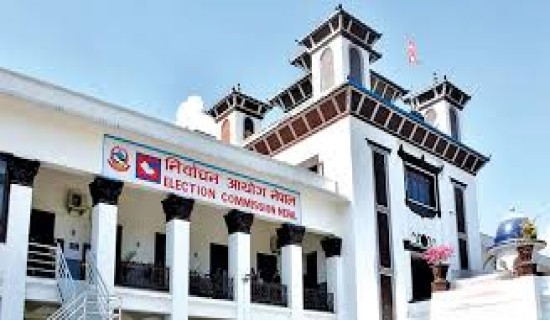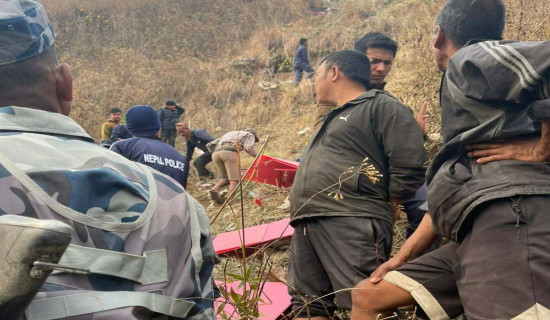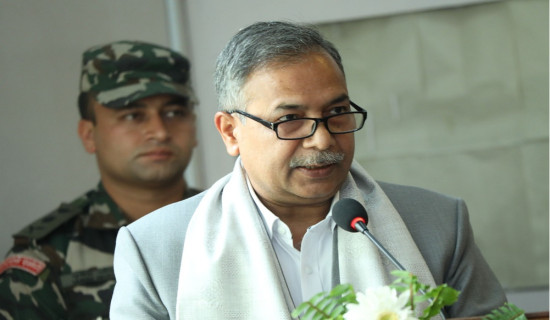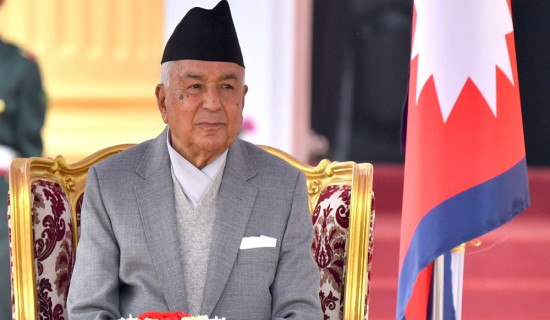- Tuesday, 3 March 2026
Democracy Is Not Zero-Sum Game
The trajectory of Nepali politics is finding many voices. The teasing fracture in the establishment has made one side reap the political spoils as a winner while the other side the real loser of the political game. To treat democracy as a zero-sum game obviously devalues its beauty that offers the possibility of credible and constructive opposition assuming that it has a rich inventory of alternative policies. Zero-sum game turns opposition into an enemy having no stake for regime survival and no interest in cooperative action. Now Nepali political parties are torn between the constitutional status quo defended by the fractured establishment and those demanding change in institutions and political culture to make it attuned to transformation.
Revival of parliament by the Supreme Court twice marks the spur of old parliamentary exercise and forms the new power equation of ruling five-party alliance led by Nepali Congress (NC). The temper of the alliance signifies the elasticity of clashing ideologies of its constituent units — right, left and the centre, its flexibility in operation and grit to hold its glue of power-sharing until the national elections are held in November. The reinstatement of House of Representatives (HoR) has restored the pivotal position of NC in Nepali politics and created a hybridised brand of economic and political dispensation. But it has suffocated other factions of establishment - CPN-UML and Madhesh-based parties. The outcome of local elections has clearly debunked this fact.
Maladjustment
Still, the maladjustment of fractious politics continues to portent the convulsing state of affairs of the nation, not opening a clear sign of institutionalisation of political parties so crucial to achieve the nation’s political stability. It seems Nepali political leaders are trapped in a sadistic vices which they cannot escape, partly because each faction believes it is absolutely right in its stance. Unless they collectively experience and learn from the stream of reflections and confess their flaws beyond sophistry, they will continue to see political life in isolated terms and muddle around the syndicated regime. So long as they are mutually put off and unable to know the optimal constitutional path to meet people’s rights beyond realising each other’s needs they will steadily lose their relevance to each other and the larger public.
This will ultimately play down their shared political life and the current outcome arising out of the joint political adventure of the past which has shielded them in the thick walls of security guards cut off from the life-world. The CPN-Maoist Centre is constantly re-evaluating its strategy and tactic. In the process, it has not forsaken its free-riding habits. It is seeking to weaken CPN-UML and shoring up its own bargaining clout for better seat adjustment in the gambit of electoral coalition through the creation of Socialist Centre and stitching the heterodox left forces and individuals. Outrageous to the ruling coalition, the UML leader is also appealing to all left forces to form a counter coalition. If each faction of political establishment is interested in maximising the strength of its own political constituency, the other will be despicably hostile and insensitive to others imperatives.
It can easily cause a national level political polarisation thus eroding common ground for future political stability of the nation and its ability to exercise national-self-determination. It is a zero-sum game that knows no compass for nation building. Obsessed with the aim to bolster their own respective political constituencies, Nepali parties are thus concerned less with the bigger frame of national politics pertaining to the public and national interests and resolve the panoply of pressing challenges afflicting the state and people. It marks a sense of apprehension, if not fear, to democracy prospects. The nonstop decline of Madhesh-based parties is prompting them to look for new reasons for existence in the political game and seek the ground for a virtuous upward spiral.
Nepal’s constitution has elaborated the long-term principles and policies of the nation in a broader context. The government has to muster its political will, credibility and resources to enforce constitutional behaviour, deliver justice and earn the empathy of multiple other sides stacked as dissident forces indulged in anti-establishment currents for its collective amnesia about the promise of progress. The ongoing ferment of protests on the Citizenship Act, inflation, corruption, cronyism, impunity and vicious downward spiral of economy has gnawed at the morale of establishment while democratic counterweight is spinning out to liberate its strength for improved rule.
The parliamentary politics has reduced internal radicalism to impotence but the public tumult against political leaders schmoozing with special interest groups is allowed to run free a cascade of grievances about the unfulfilled promises of the establishment for better life of people. It has also raised the high-stake competition of geopolitical forces to strain Nepal’s unsettled transitional politics and set the vigour of a small state diplomacy in international milieu and reputation in litmus test. Leaders for long living in comfort zones of partisan politics seem suddenly helpless to suggest neighbours China and India and the USA not criticise each other from Nepali soil to evade the infection of turbulent moments of world politics.
But they know the site of internal politics is spilling outside the national boundaries despite the selfish gene of people. It has entered into non-political territories of business, bureaucracy and geopolitics. The nation must restore the credibility of its classic policy of nonalignment and cultivate its intrinsic strength of geostrategic disposition without making any subterfuge about policy resetting that saps its energy and forces it to retreat into a skin of neutralism, not nonalignment, without a rational voice and visibility. Nepal must remain sensitive to neighbours and great powers manoeuvring into global orbit and competing for allies, strategic partners and buffers. It must keep observing global game-changing mega geopolitical trends shaped by the gambit of great powers having complex implications for its security, independence, progress, order and peace. In critical times, creative policy matters for the safe internal cohesion and external adaptation of the nation.
Fading economic prospects, suffering from the combined effects of pandemic, Ukrainian crisis and huge loss of export trade, is worsening the civic life of Nepalis. The costs of unscrupulous and unprincipled politics on the economy, especially trade and debt, are greater than ever. Politics as usual is inestimably eroding civic norms, institutions and integrity of governance, draining the social capital of the nation and the state’s relationship with society. In this condition, the bulging youth population of Nepal is not finding a satisfying role in the economic and political life of the nation other than to be dragged into the gamble of the global labour market to sustain livelihood. Others find brain drain as a form of social emancipation.
Social policies are urgently needed to make migrant workers stakeholders of the nation and address the national problems originating from the privatisation and informalisation of politics. Promotion of production revolution and civic values on the mass scale and personal responsibility among aspiring young politicians are essential incentives to enable them to stay at home and engage them in political and national reconstruction. This requires ending the culture of impunity for political class and special interest groups beyond verbal rhetoric so that national surplus thus saved from the privatisation of public money is invested in public good, the personalisation of public property penalised and their subversive implications for the state controlled.
Nepali leadership immediately needs to craft context-sensitive extensive civic education and initiatives aiming to transform the pre-political identity of people into sovereign citizens through mobilisation, communication and politicisation. It is important to induct Nepalis into a civic culture. Agencies of Nepalisation are mediating arrangements between individuals in their private life and the larger institutions of public and national life. They can help acculturate youth into their duty to constitutional patriotism and uphold the spirit of zeitgeist embedded in cosmopolitan laws. It helps to overcome Nepali youths’ lethal attraction to avant-garde politics of today rooted in rationality, efficiency and competitive spirit and utilise the strength of traditional moral teaching.
Equality of citizenship
It is important to construct the equality of citizenship and develop their loyalty to the Nepali state. Otherwise, the operation of a de-globalised and diverse form of market economy can polarise the nation, narrow the writ of the national self-determination and foster post-national affinity. Training on citizenship allows them to gain entrepreneurship skill, keep due diligence on the operation of power, wealth and knowledge, protect democracy’s self-correcting character and manage the post-national constellation of the polity, market and civil society within the bounds of the state. It prevents the dissolution of the rule of law into leader oriented politics. Democratization of families, media, civil society, political parties and educational institutions incubate free societies where the majority and minority can share space in common and peacefully mediate their differences beyond cave mentality.
Bringing the connectors of society for social integration and system integration is another vital task to transcend the nature of partisan politics where each fractious group builds its own ferocious political constituency without any sense of comfort. The other task is to open leaders’ excessive partisan minds to national perspective and the greater whole-Nepali community, nation, state and the world. It disentangles them from parochialism and cultivates a harmony between the constitution and constitutional behaviour of all leaders and resolves the predicament their political culture bred so that each Nepali can find equal opportunity for experiencing life’s fullest scale possible within the nation.
(Former Reader at the Department of Political Science, TU, Dahal writes on political and social issues.)











-original-thumb.jpg)




